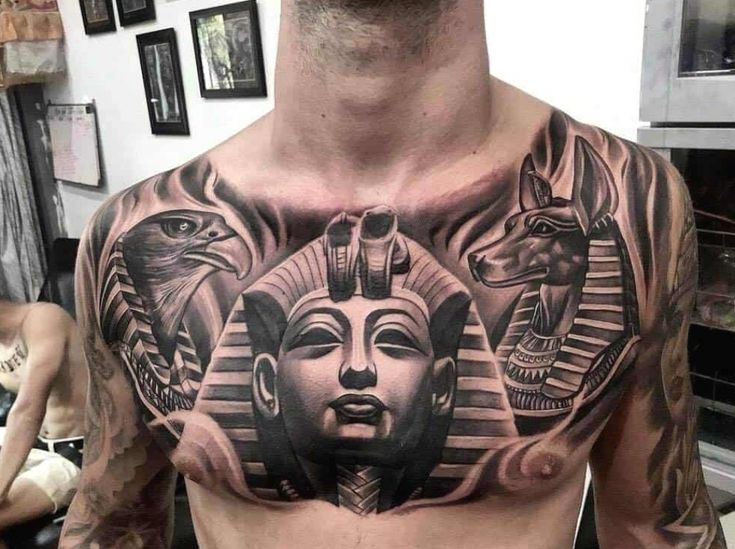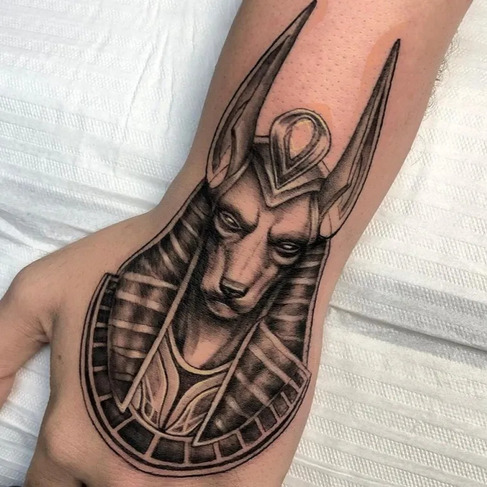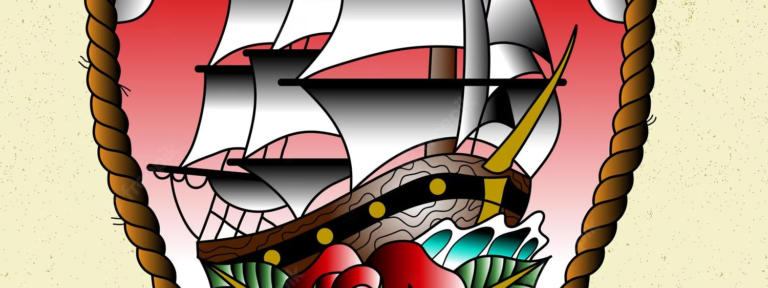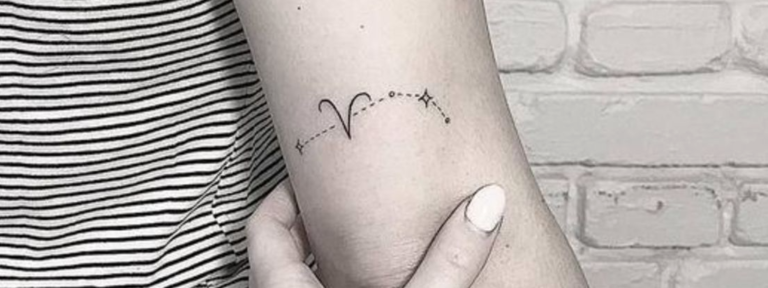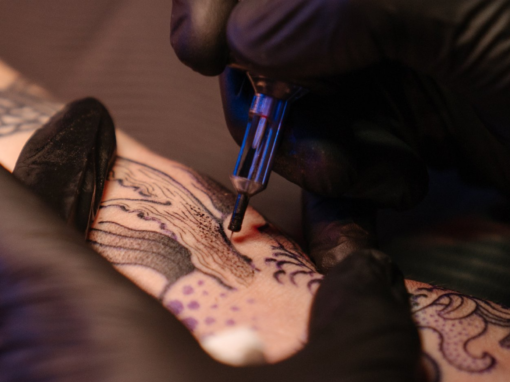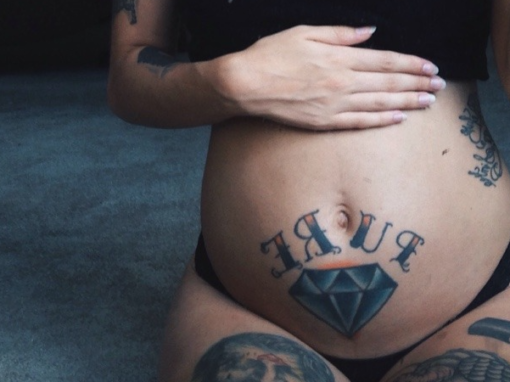Many people have been drawn to the ancient Egyptian god Anubis because of his mystery and strength. He is frequently represented as having a man’s body and a jackal’s head. A tattoo with the image of Anubis represents spirituality and protection, immersing you in the atmosphere of the ancient world. This tattoo is all about expressing your individuality and uniqueness.
We want to show you the world of Anubis tattoos, introduce you to the history of this god, and offer you 50 outstanding tattoo designs. Are you interested? Then, keep reading to find out all the details.
Looking for Tattoo Ideas?
The Appearance And Role Of Anubis In Mythology
Anubis, also known as Anpu, is an ancient Egyptian God, portrayed as a man with the head of a jackal. According to legend, Anubis was the son of the Egyptian god Osiris. After Osiris was killed, his remains were scattered all over Egypt. Anubis helped put them back together and performed a burial ceremony for his father. As a result, Anubis became the deity of funerals and the guide of souls to the afterlife.
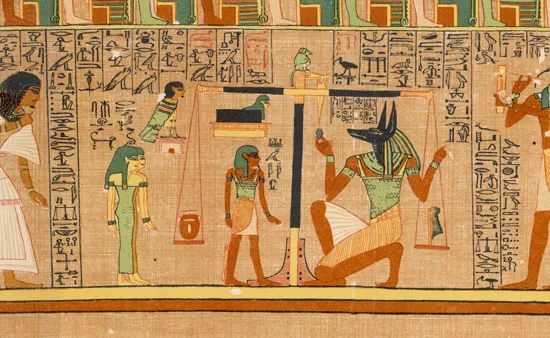
Therefore, in Egyptian mythology, Anubis was associated with tomb care and guarding. He kept watching over the deceased, accompanied their souls, and shielded them from all dangers on their journey to the afterlife. Anubis was often depicted near the entrance to the tombs and during rituals related to mummification and burial.
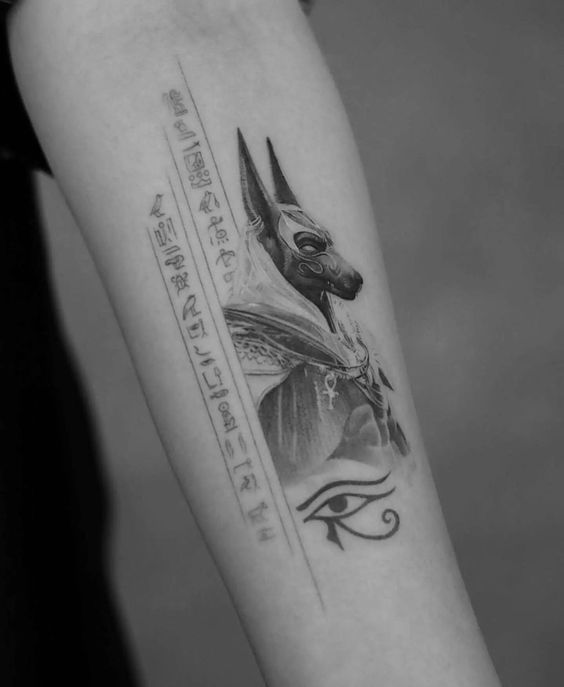
In fact, the role of Anubis in mythology is very significant. His presence offered burial rituals magical power and meaning, as well as protection and patronage to the dead on their trip to the afterlife.
Anubis Tattoo Meaning
The Anubis tattoo has a very deep and symbolic meaning. Let’s dig deeper and learn more about its significance.
- Protection: Anubis was the patron and protector of the dead in Ancient Egyptian mythology. The Anubis tattoo may reflect the wearer’s need for protection and help in his life, especially during times of difficulty or transformation.
- Symbolic Journey: Anubis has also been linked to the passage of the dead’s souls to the afterlife. The Anubis tattoo might signify the wearer’s symbolic journey or transition in life, representing their desire for personal progress and conquering hurdles.
- Strength and wisdom: In Egyptian mythology, Anubis represents strength and knowledge. Tattoos might represent these characteristics by conveying the wearer’s desire for strength, knowledge, or spiritual enlightenment.
Symbolism in Anubis Tattoos
Apart from the ones listed above, Anubis tattoos can have even more profound meanings if you add certain symbols. The symbols bring their meanings to the tattoo and make it more unique. Today, we’d like to discuss these symbols: the lotus flower, Ankh, the sun, the Eye of Horus, pyramids, and Pharaoh’s mask. Let’s dive!
⬛ Lotus Flower: In ancient Egyptian mythology, the lotus means purity, enlightenment, and rebirth. The addition of a lotus flower to an Anubis tattoo might accentuate the idea of soul transfer and rebirth after death.
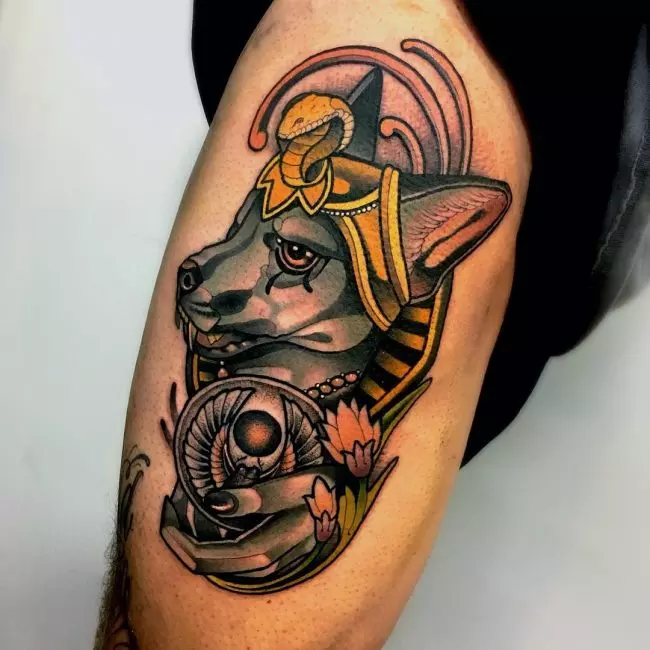
➕ Ankh: Ankh is an Egyptian symbol of immortality and life. It is a cross with a loop on top. The addition of the ankh in the Anubis tattoo represents the passage to the afterlife and indicates eternal life.
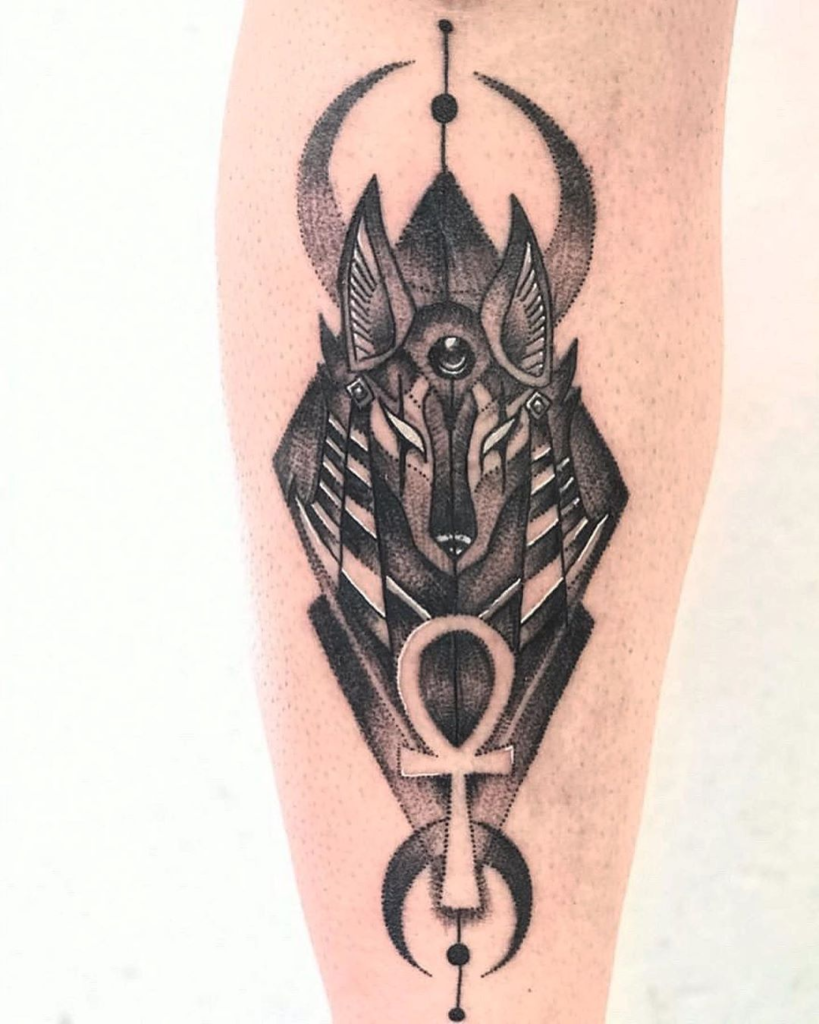
🔆 The sun: The sun has a special meaning in Ancient Egyptian mythology, representing divine light and vitality. An Anubis tattoo with an image of the sun or its rays can stress his relationship to godly power and spiritual enlightenment.
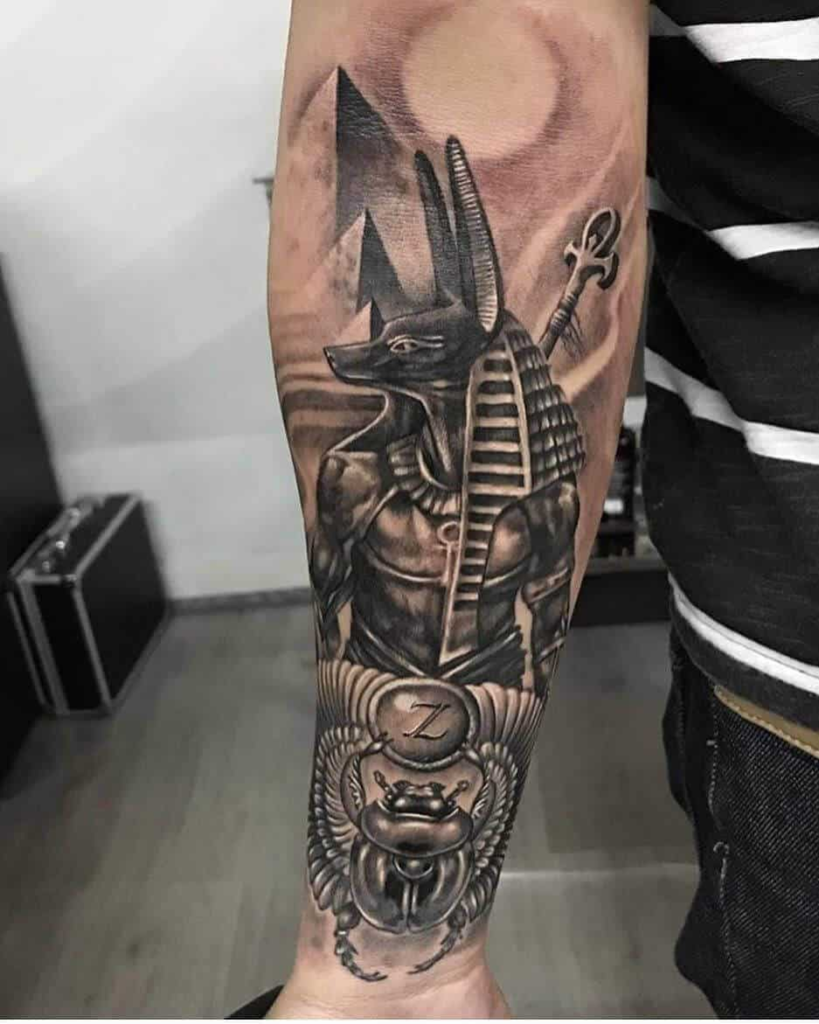
👁 Egyptian Eyes:The Egyptian eye, known as the Ujat or Eye of Horus, represents the gods’ protection and blessing. The Ujat’s inclusion in the Anubis tattoo may allude to its role in guarding and guiding souls on their passage to the afterlife.
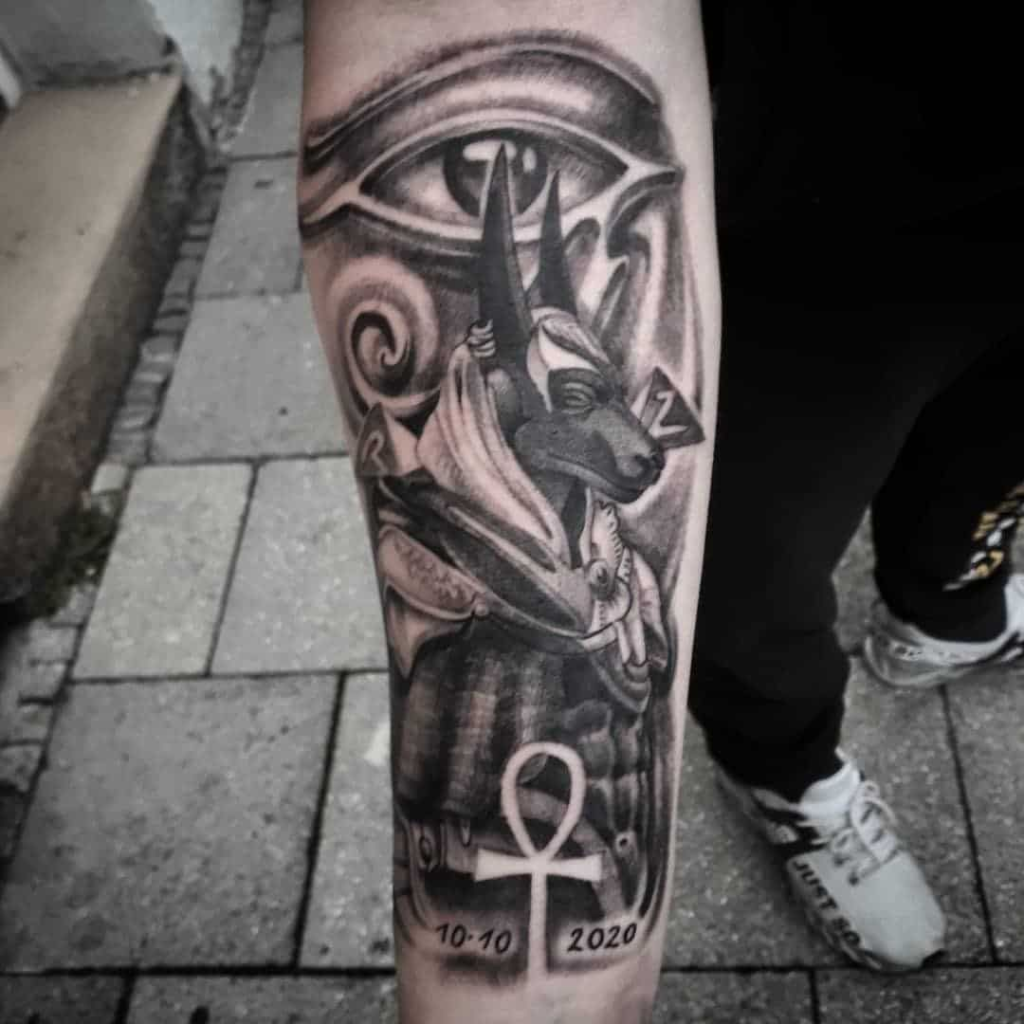
⏳ Pyramids: The pyramids are famous buildings linked with the world of the dead in Ancient Egypt. Their placement in the Anubis tattoo may allude to his function of graves and tombs, as the soul’s passage to the afterlife.
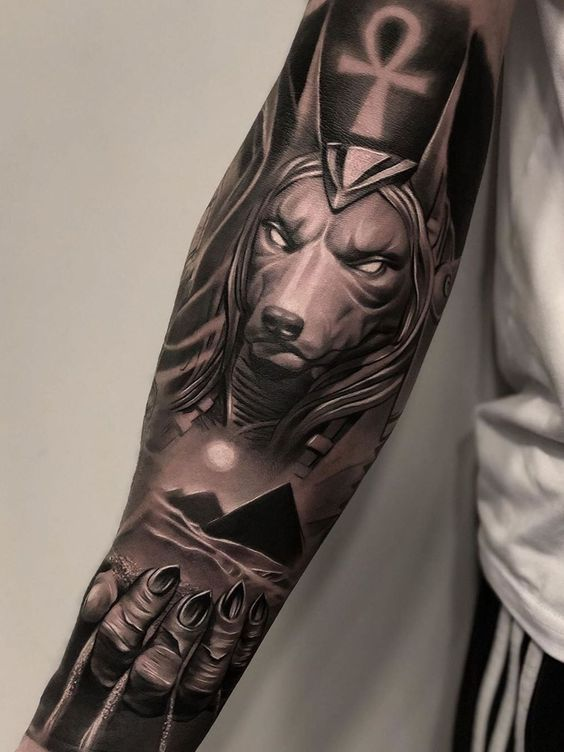
🎭 Pharaoh’s mask: The pharaoh’s mask is a symbol of authority and majesty. Adding this sign to the Anubis tattoo might underline his connection to royalty and his role in protecting and leading monarchs into the afterlife.
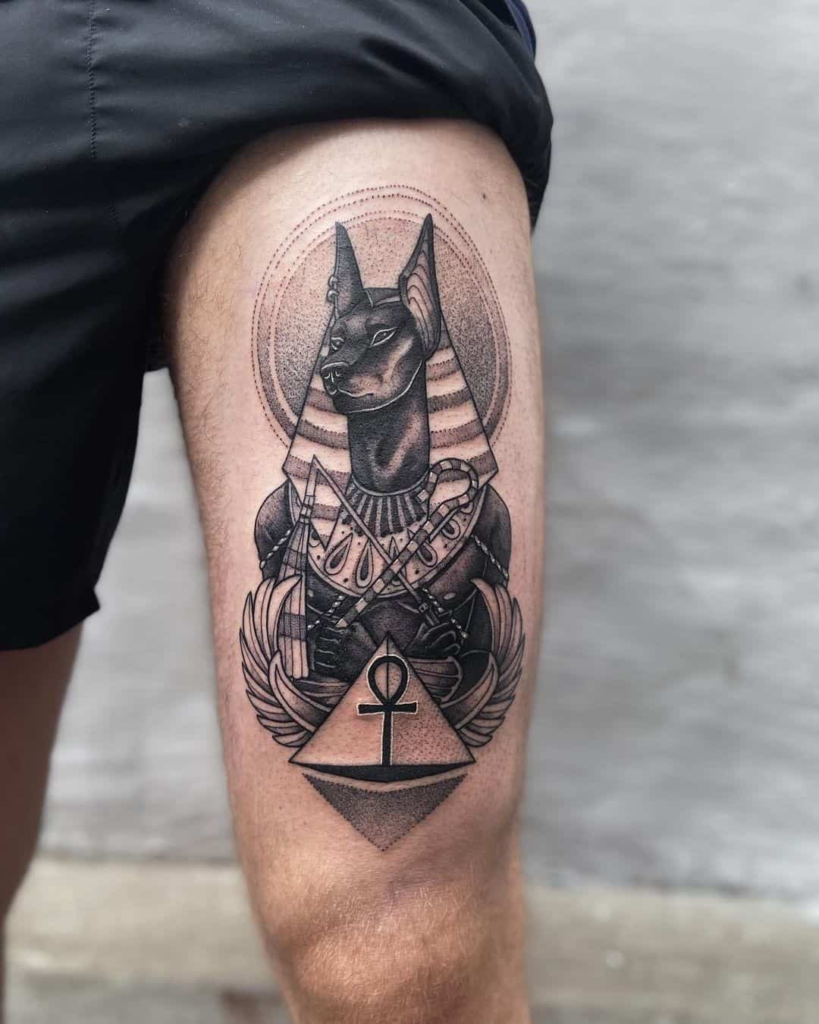
Can Anubis Bring Good Luck?
Long story short: not really. It depends on your perception.
In ancient Egyptian mythology, Anubis was the god and protector of the dead, guiding them to the afterlife. In this context, he was not explicitly associated with bringing good fortune to ordinary life.
It is critical to recognize that the meaning you inscribe on the tattoo will be vital and decisive. Some believe symbols and images such as Anubis can bring them good luck, protection, or help in difficult situations.
Some people identify Anubis with the concept of good luck or protection in modern symbols and interpretations. This could be related to the concept that Anubis possesses a force or energy that aids in overcoming obstacles and attracting riches.
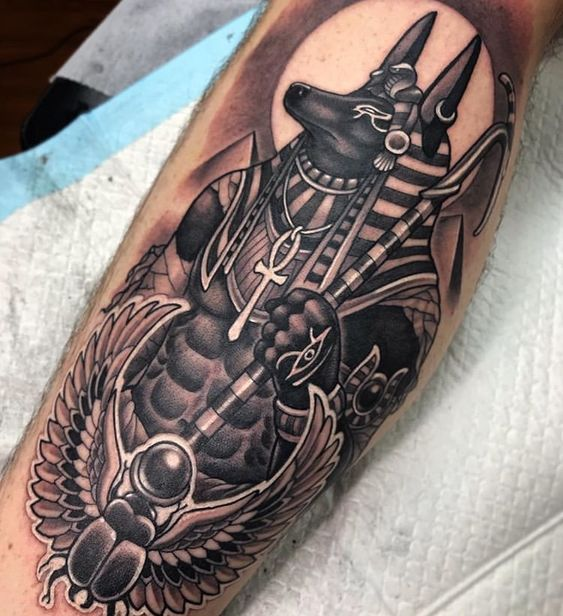
Anubis Tattoo Ideas
Consider the following factors to get the best Anubis tattoo on your body:
- Color: Use dark colors to convey an atmosphere of mystery and enigma. Also, favor gold and sandy hues.
- Details: Add details that help make your sketch more realistic. Every part of Anubis’ appearance should be well elaborated to give the tattoo depth and expression.
- Extras: Add more details, such as Egyptian pyramids, sand, sun, or dark shadows to the sketch. It will help make the image more profound and bring out a deeper atmosphere.
Let’s look at examples of the Anubis tattoos in more detail.
On The Leg
The Anubis tattoo on the leg can symbolize protection and transition to another world, as well as patronage and help.
Most people choose the realism style for this kind of tattoo. It helps to recreate the sketch in maximum detail. It will also be able to convey the realistic features and expressiveness of Anubis’ face, as well as details of his mythological attributes.
On The Arm
An Anubis tattoo on your arm can represent your desire for wisdom, deep comprehension, and knowledge. It might serve as a constant reminder of your drive for self-development and improvement.
A tattoo like this would look best in a graphic style. It can contain geometric elements, clear lines, and symmetrical shapes that emphasize its strength and symbolic significance.
On The Back
Anubis represented wisdom and intelligence. An Anubis tattoo on your back could reflect your search for wisdom, intuition, and insight. It can also represent your ability to guide others on their spiritual path.
An Anubis tattoo on the back in black and gray tones can create a mysterious and magnificent image. The deep hues and detailing can enhance the character’s magical aura.
Tattoo Of Anubis With An Eye
The eye can also represent a spiritual journey and direction. An Anubis eye tattoo could represent your desire for self-awareness and spiritual development. It can act as a reminder of your abilities to navigate your spiritual path and guide others on theirs.
Most often, tattoos in this design are tattooed in the traditional style. It helps to give an authentic look and reinforce the symbolic significance.
Anubis Tattoo With A Jackal
Anubis with a jackal has rich symbolic implications and is commonly associated with Egyptian mythology, where he was also considered to be the deity of death and the man who protected the tombs. The jackal is associated with the symbol of the afterlife and the dead.
As we mentioned, the style for the best Anubis tattoos is realism. Likewise, we would recommend it for this design, as it helps to emphasize details and make the most believable image.
Horus & Anubis Tattoo
The tattoo of Anubis and Horus connects to Ancient Egyptian mythology symbolism. Horus and Anubis represent two distinct gods, each with their own meanings and relationships.
- – Horus is the god of heaven and the keeper of law and order in Egyptian mythology. He is frequently represented as a guy with a falcon’s head. Horus is seen as a sign of strength, justice, and protection. His image is often connected with battle and triumph against evil.
- – Anubis, on the other hand, is the god of both the dead and the living.
As for many other designs in this article, realism is the go-to style for these tattoos. It helps to achieve maximum detail and authenticity in the images of Horus and Anubis. The eye of Horus is another trendy tattoo design because it has a strong meaning and represents power.
Evil Anubis Tattoo
The evil tattoo of Anubis also has a very deep meaning. He was considered the patron saint of the dead and was the guardian and guide of souls to the afterlife.
An evil tattoo can be related to traits associated with this god, such as power, justice, death, magic, or the afterlife. It can be used to show personality, devotion to old mythology, or simply as a decorative element.
Summary
The Anubis tattoo is a powerful mythological and historical symbol. In Ancient Egyptian culture, Anubis was a god associated with the world of the dead and the protection of souls.
This tattoo can be a source of positive energy and inspiration. It is very important to understand that for each person, the tattoo has its own deep meaning, though. Moreover, it’s vital to find a proven and good tattoo artist so that the sketch looks good and meets your expectations.
Let’s take another look at the top 3 most popular Anubis tattoo designs.
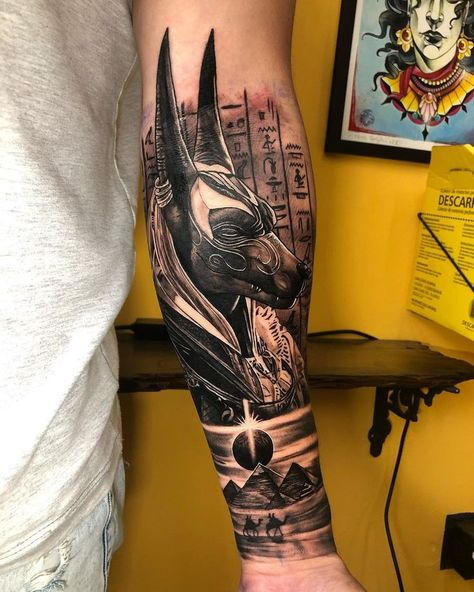
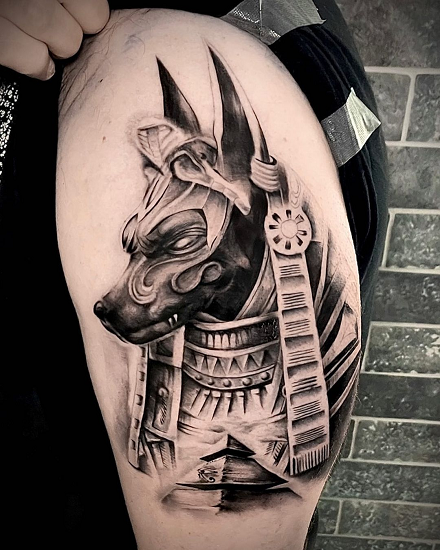
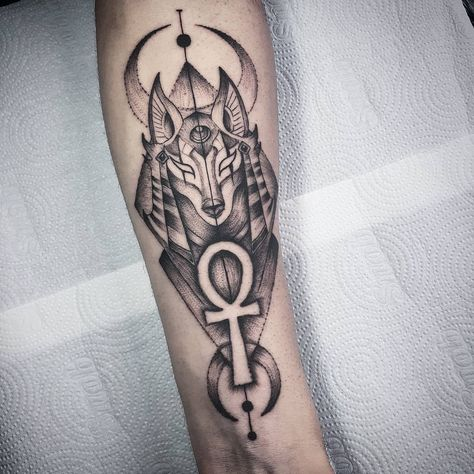
FAQ
👁🗨 What Is the Role of Anubis?
The role of Anubis is in Ancient Egyptian mythology was very great. He was considered the patron of the dead and the guide to the afterlife. Anubis was a major deity associated with burial rituals and beliefs about the afterlife.
⚡️ What Is the Symbol of the God Anubis?
The head of a jackal is one of Anubis’ most important symbols. In the culture of Ancient Egypt, the jackal was associated with the world of the dead, and its head represented Anubis. This symbol directly links Anubis with ancient Egyptian mythology.
🤔 What Does an Anubis Tattoo Mean?
In Ancient Egyptian mythology, Anubis is frequently connected with the patronage and protection of the deceased. An Anubis Tattoo Ideas might represent the spiritual and physical power and protection that the wearer aspires or wishes in his or her life.
❓ Why Is Anubis Special?
Anubis was a deity associated with the afterlife who guided the spirits of the deceased. He was involved in funeral ceremonies and patronized embalming, allowing the deceased to enter the afterlife. In Ancient Egyptian society, his presence was associated with the understanding and support of the journey from life to death.
